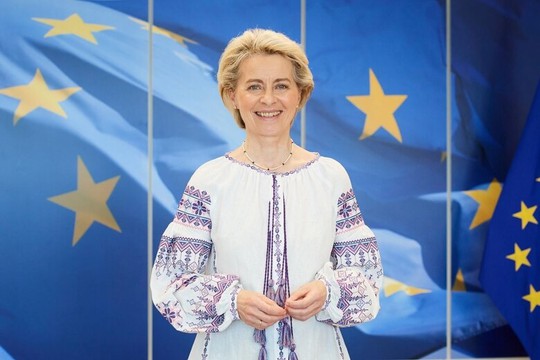Ursula von der Leyen, president of the European Commission: I don't have money, but I can help Kyiv if I wear clothes that look Ukrainian.
Photo: DW
For all the EU’s rousing words, there just isn’t the money or the will to keep defending Ukraine, Roger Boyes, ‘The Times’ observer notes.
The money to keep Ukraine armed, healthy and warm is drying up. The western will to support the war is evaporating. The defence of an independent Kyiv has slipped down the hierarchy of strategic emergencies.
You might think otherwise listening to the political rhetoric — Europe must fight for its values and for the right to choose its destiny, said Ursula von der Leyen, president of the European Commission — or indeed monitoring the hectic military and diplomatic battlefields.
Von der Leyen’s supposedly pugnacious outburst still dodges the critical question facing the West: “Is there anything worth fighting for?”
The new US sanctions disrupt an important source of Moscow’s export revenue but won’t stop it creating new layers of shell companies. The sanctions news actually raised oil prices.
This winter will see a more concentrated Russian assault on Ukraine’s so-called fortress belt on its eastern front. If these defensive lines start to fall, then the way would be clear for Russian troops to move into central Ukraine.
The plan seems to be to open up the east — a few hundred Russians have already been seen in Ukraine-held Pokrovsk spotting and killing drone operators who could slow the advance — and then prepare for a surge into the Ukrainian heartland in the spring. The Russian military is thus walking in step with the Kremlin’s assessment of how long it will take before Kyiv’s finances start to fold. European Union leaders seemed to be on the brink of agreeing a reparations loan to Ukraine based on the €150 billion of Russian assets frozen since the early days of the war. The EU has been using the interest from these assets to contribute about €3 billion a year to Ukraine’s defences. If some way were to be found to transfer the whole sum to Ukraine it could continue to fight and stay alive. The cash transfer, however, would almost certainly be seen as illegal by the Kremlin and challenged in the courts.
Moreover, if the EU’s move were to be presented as an advance on Russian reparations, then that too would be contested by Putin since he wants to emerge from the war as an acknowledged victor. He is in no mood to pay reparations or even agree to a joint assessment of war damages. Who in that case would foot the bill? Belgium, having read the small print, realised that the bulk of the bill could land with them since the assets were deposited in Belgian-based Euroclear. So no go-ahead from them.
How, in these strained times, could European taxpayers be landed with Russia’s never-to-be-paid reparations?
Here then, in this tangled debate, lies the rotten heart of European war fatigue. Ukraine has enough funds to last only until the end of the first quarter of next year with which to fight an existential war and keep its battered state functioning. Its defence budget for this year has risen to $70.86 billion; its total estimated state revenue for next year is $68 billion. The EU promises it can keep Ukraine going financially for another year or two. But there is not a single hard-right party in Europe, in or out of government, that would currently subscribe to that.
To the Russians the calculation is clear: use their newly enhanced expertise in drone warfare to make this a winter hell for the Ukrainians… in the hope of turning the people against the Zelensky government, nudging him into a disadvantageous settlement and a broken, polarised state.
I wish it were not the case but it’s what the numbers tell us. There are no winter miracles in eastern Europe. Prepare for the peace; it won’t be pretty.
read more in our Telegram-channel https://t.me/The_International_Affairs

 11:44 31.10.2025 •
11:44 31.10.2025 •























